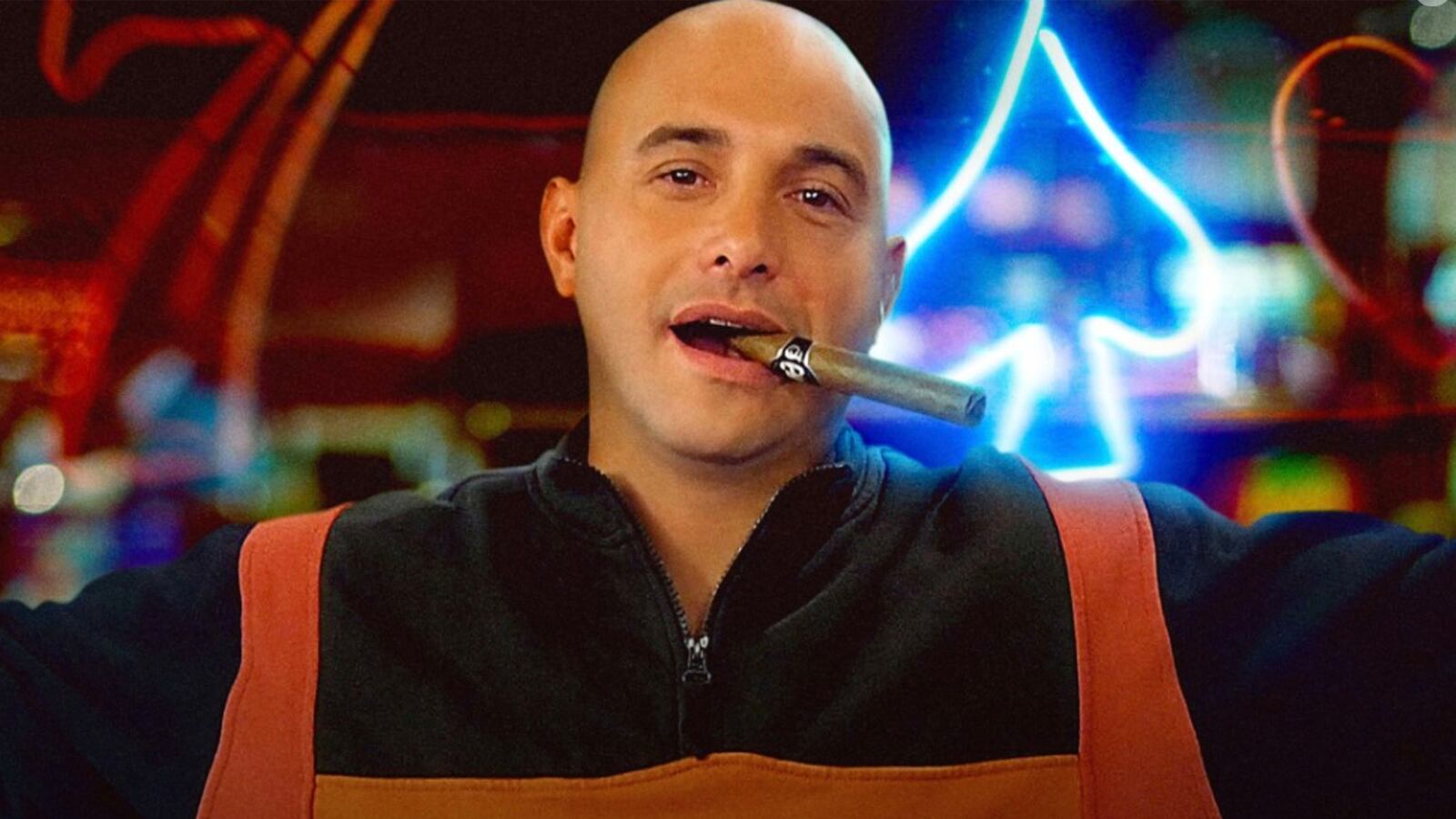“Cocaine is a hell of a drug,” proclaimed Dave Chappelle’s Rick James, and the same is true of gambling. For proof, just ask Craig Carton, whose world collapsed in 2017 thanks to an addiction to blackjack and the ensuing fraud he perpetrated to pay off his debts.
A counselor featured in Wild Card: The Downfall of a Radio Loudmouth equates playing cards for money with snorting fine china, since both produce a high that can only be replicated through endless—and increasingly reckless—repetition. There’s clear evidence that it was a quest for that rush, and a sense of control, that did in Carton, co-host of WFAN’s #1 rated morning show Boomer and Carton (with Boomer Esiason). A bald, motormouthed New York City native described by his partner as “a cross between a Martian and like Don Rickles,” the uninhibited Carton was a superstar in his field. His celebrity life and career, however, came to a screeching halt when, on September 6, 2017, he was arrested by the FBI for securities and wire fraud, as well as conspiracy to commit those crimes.
Directors Martin Dunn and Marie McGovern’s Wild Card is a non-fiction cautionary tale about the dangers of gambling, deceit and hubris. It’s also a saga about how sometimes, winning big is the surest way to guarantee that you lose—a dynamic that’s also relevant to their film’s own form.
Dunn and McGovern’s HBO documentary (premiering Oct. 7) is bolstered by the participation of Carton, who after spending a year-plus in Pennsylvania’s Lewisburg Penitentiary, is now a free man and serves as the narrator of his own story, candidly recounting his rise to the apex of the talk-radio mountain and then his downfall due to a combination of big-time wagering, shady ticket-brokering deals, and an arrogant belief that he could balance everything and come out on top. Yet Carton’s participation is also what holds this doc back. Too frequently letting him serve as its primary analytical voice, and refusing to plumb some of its thornier angles, it forwards a self-authored redemption narrative that—replete with more than a few corny aesthetic devices—is too neat and tidy for its own good.
Central to Wild Card’s missteps are dramatic scenes in which half-glimpsed actors navigate underlit settings in a fuzzy-bordered frame, and reenactments of Carton’s prison stint set to the sound of him reading from his own therapeutic prison journals. Couple that with more than a few line readings that sound overly scripted, and the result is a documentary that often feels like a puff piece being steered by its subject. Were it more willing to peer into other aspects of Carton’s life, Dunn and McGovern’s film might have overcome that overarching impression. Yet with only fleeting mentions of his family (none regarding their attitude toward Carton’s misdeeds, nor his separation from his wife), and only cursory discussions about his upbringing, the proceedings often prove unduly manicured and slight.
Nonetheless, if far from hard-hitting sports journalism, Wild Card does impart lessons about the hazards of unchecked ego. After post-collegiate stints in Buffalo, Cleveland, Philadelphia, and Denver, Carton returned to the tri-state area, bringing his brash anything-goes style to WNEW (paired with Sid Rosenberg) and New Jersey 101.5 (where he befriended future governor Chris Christie, featured here). When radio legend Dom Imus was booted from WFAN for his infamously racist remarks about the Rutgers women’s basketball team, Carton’s dream job became available. Having delivered ratings and revenue to every station at which he’d previously worked, he nabbed the coveted gig, which teamed him with famous NFL quarterback Esiason in a good cop-crazy cop format.
Boomer and Carton gave Carton a vehicle for his unbridled gonzo antics, and as he rightfully states in Wild Card, his lunacy brought in listeners, regardless of whether people loved or hated him. His impressive skill at blackjack, however, soon got him into hot water, beginning with a famous promise to Esiason—during their annual broadcast from Atlantic City’s Borgata casino—that he could turn the ex-football player’s $10,000 into $25,000 in a single night. Carton’s success in this endeavor not only convinced him he could put his money where his mouth was, but attracted the attention of shady investors who were soon wiring Carton upwards of $1 million—as well as handing him duffle bags full of cash—so he could net them equally lucrative profits.
Carton’s most amazing story involves a mysterious benefactor giving him $500,000 with an expectation of a 5% return, and Carton earning the guy his $550,000, and an extra $1.5 million for himself, in twelve hours—and then losing all of it over the course of the next half day. The sheer scope of the shock-jock’s problem (and abilities) is eye-opening, and predictably, it couldn’t last. After squandering that enormous sum, he found himself in deep to various (unnamed) guys. In response, he broke the law, using a hedge fund’s legal investment in his ticket-resale business to cover his losses. Ignominy followed, and also the end of his tenure at WFAN and, temporarily, his close friendship with Esiason.
Aside from employing a wealth of clips from Boomer and Carton (which aired on television on the MSG Network and CBS Sports Network), Dunn and McGovern get just about everyone in Carton’s WFAN orbit (Esiason, anchor Jerry Recco, board operator Eddie Scozzare, producer Al Dukes) to discuss their comrade’s broadcast-radio gifts and catastrophic mistakes. Carton claims that those blunders are intrinsically related to the sexual abuse he suffered as a child and kept secret from everyone for decades—a situation that, he says, taught him how to hide ugly truths from the world. The lingering effects of Carton’s adolescent trauma are supported by footage of him railing against Jerry Sandusky and Joe Paterno for their own pedophilic assault-and-cover-up scandal. Yet even when addressing this potentially intriguing notion, Wild Card plays more like an act of image rehabilitation than a warts-and-all non-fiction investigation, thus neutering a significant amount of its objectivity—and, consequently, its persuasive power.


